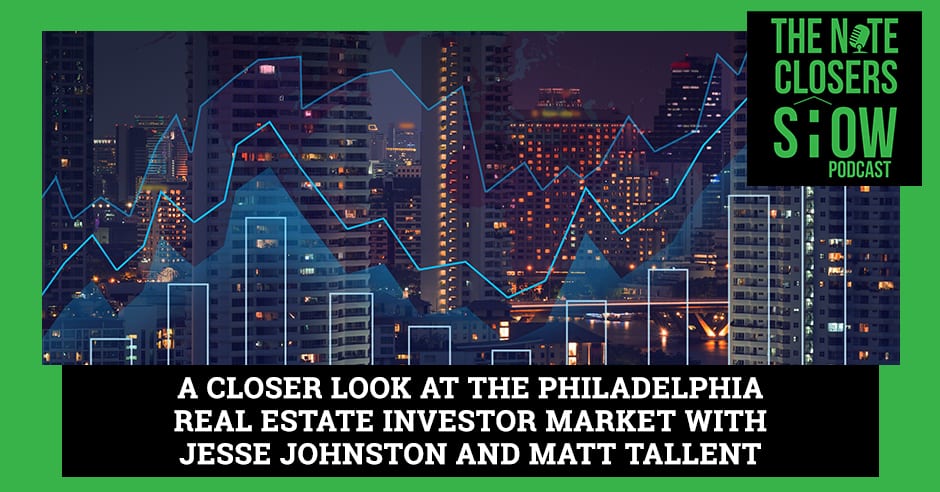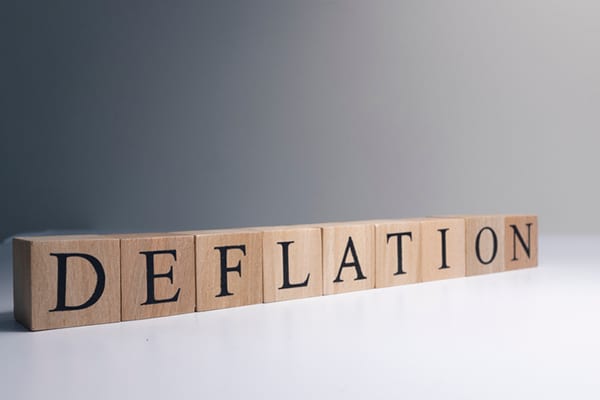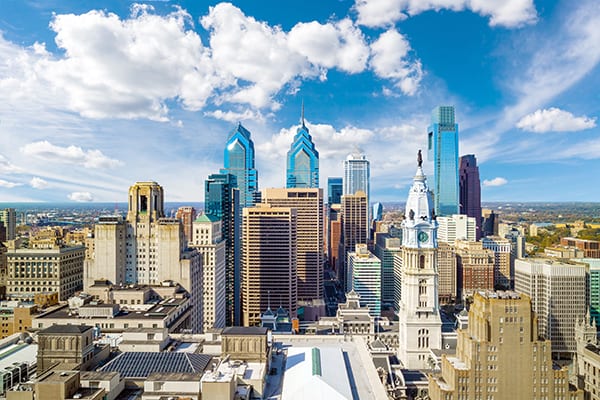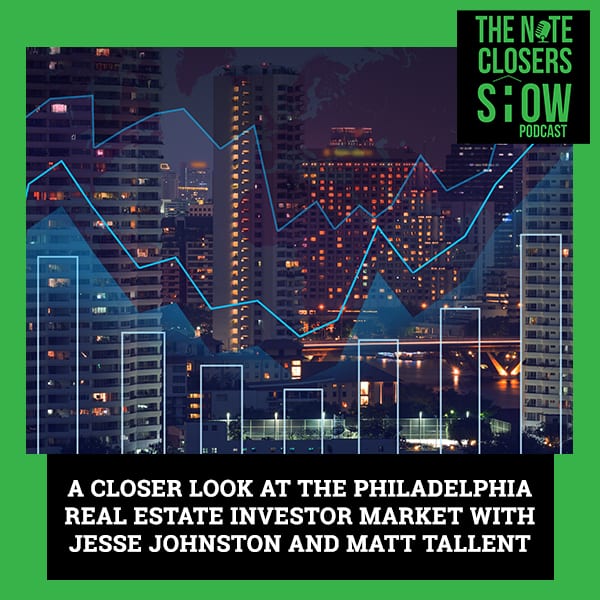
World-famous for its delicious cheesesteaks, Philadelphia has reopened after its momentary pause due to the COVID-19 pandemic. Philadelphia, colloquially known as Philly, is the largest city in the US state of Pennsylvania. On today’s podcast, Scott Carson talks with realtors Matt Tallent and Jesse Johnston about the Philadelphia real estate investor market. Matt and Jesse are the co-hosts of the How Real Estate Works podcast. Want to know if it’s the market you should invest in? Then stay tuned.
—
Watch the episode here
Listen to the podcast here
A Closer Look At The Philadelphia Real Estate Investor Market With Jesse Johnston And Matt Tallent
I’m excited to be here with you. I’ve got a double dose of guests on here. These two guys are the cohosts of the How Real Estate Works Podcast. One guy runs a real estate team and the other guy is the agent, house-hacking investor, building a portfolio for themselves. I’m honored. These guys are doing amazing things in the City of Brotherly Love, as we like to say, Philadelphia. They are big Cowboy fans out there. We’ve got quite a bit of our Note Nation audience up in the Philly market, invested in Philadelphia. We’ve spoken about that neck of the woods a couple of times in some different events.
As we roll across the country with our city spotlight tour, I’m excited to have both these two rockstars. As they like to say, one’s the old dog and the other ones the new dog as far as their experiences. What I love is they bring a blended opinion of the market. You can hear the highs, the lows, the new experience to see some things. I’m excited to have these two amazing guys, Jesse Johnston and Matt Tallent joining us here on the show. What’s going on guys? How’s it going in Philly?
Thanks, Scott. We’re excited to be here.
How’s everything going up there with all the chaos going on? Did the city open back up? Is the market strong or has it slowed down? Let’s start first with you, Jesse, then we’ll bounce it to Matt’s opinion about the market as well.
We run a pretty big team. We have 30 agents that work on the team. We have people in the city, in the burbs and the exburbs. We get sampling of everything. The city got soft for a minute and then it exploded. You mentioned the chaos. There was a pause for a minute, then we’re seeing things open up. While that momentary pause was happening, the suburbs were on fire. The constant conversation I’m having with the agents that work for us is, “How do I make my buyer stand out in a market where things are that crazy and still protect them?” We’re still seeing homes all the way on the exburbs selling in less than 30 days. I like a healthy market. I don’t love a crazy market but I’ll take it coming out of crazy times to see things open up. If I could show you our pipeline, it’s a legitimate V-shaped recovery, just on our own personal pipeline.
Are you seeing more in specific price ranges? People are doing well and moving faster. Are you seeing people trying to get out of the big city and be somewhere more rural so they’re not on top of each other?
Because there are less travels, homes with pools have been a very big search topic locally. We are seeing people selling their condo and moving to the suburbs to have some outdoor space. That is a market right now.
Matt, what are you seeing as far as the real estate investors out in that neck of the woods? What’s their focus, what’s moving, and what’s doing well in the Philly market?
What happened in Philadelphia and Pennsylvania was in March 16th real estate were shutdown. We weren’t allowed to do in-person tours until May 18th when that opened back up. During that time, it was still pretty crazy as you kept your home on the market. I had buyers who were trying to get videos or some look at the house. I was like, “We’ll put an offer. We need a video of the house.” Someone had already bought the house sight unseen. It’s pretty crazy. We were seeing home still selling in 1 or 2 days. In terms of numbers from March, units listed were 1,953 homes. In April, it was down to 800. A lot of people pulled their homes off the market or temporarily withdrew them. In May, we saw the numbers come back a little bit to 1,748. In June, we’re seeing inventory at 4,600 homes listed, but compared to 2019, there were 8,500 homes listed.
It’s a seller’s market. It’s cut in half from where the numbers were in 2019. From the investors that I’ve talked to, especially in terms of note investing, they were excited to see if that note investing markets are going to pick up. They were looking at Q4 that maybe some inventory would come in with notes. In terms of investments, I had a buyer who was working on a duplex that got seven offers on it. The house flipping market, there’s a good deal to that. People are still being aggressive with house flipping and everything like that. We’re still seeing stuff that’s on the market fly off, whether it’s a house flip, an investment property or a regular residential home.
We got an email from our lender and it was a video from Mark Zandi from Moody’s. He’s is right here in West Chester where I live, so it makes me feel good. He’s saying that the market’s going to soften at the end of 2020. He put a caveat at the end of it like, “The market couldn’t be any better right now. The fact that it’s going to soften is not a major warning.” What they’re saying, and this is probably good for note investors is the forbearances are going to hit. There are going to be a slightly elevated unemployment rate at that point too. He’s saying that that combination is going to lead to some potential softening. Any investors should be paying attention to that. That’s where the opportunities are.
I got off the phone with a guy on Wall Street before we jumped on here talking about that. On the residential side, you’re still figuring out how long Fannie and Freddie and those guys are going to delay the forbearance agreements. They’re going to do a second forbearance agreement in six months and kick the can down the road a little bit. What about the commercial markets there in Philadelphia? What are you seeing as far as commercial properties? Those are going to get hit first before the residential side. As you have investors that have properties and strip malls aren’t going to get the bail out and their tenants have stopped paying as well. Are you seeing an increase in listings for commercial properties?
We’ll probably speak more anecdotally to that. The How Group does own some investment properties and things like that. For the most part, we didn’t see any reduction in rent payments on that side. However, there are other property managers that I know where they were seeing slow down in payment and I do think that market is soft, but I don’t have the numbers on it.
I think the numbers are delayed anyway for a variety of things. I know that some of the government bank regulation websites were giving banks, especially FTSE banks, an extra month to get their numbers from Q2 because of everything going on. Matt, do you want to chime in and share something?
Where I live at is in Manayunk, PA. It’s in Philadelphia but it’s a small town. It has a main street with a ton of commercial properties. What I’ve seen there is there was one big bar and restaurant that was on its way out and this COVID crisis was the final kick. That place announced that they were shutting down. I knew someone else who worked at a high-end bar and restaurant in Manayunk. It did well. They announced that they were closing too. I asked them if they were on their way out or was Coronavirus what’s caused the shutdown? They’re like, “It was completely due to the shutdown.” It’s sad to see the small commercial businesses that don’t have franchises everywhere. They don’t have a leg to stand on.
You’re 100% right. I hate to see mom and pop businesses going out of business. The restaurant space and the smaller hotel space are going to be hit. It can be some opportunities for those that come in, either trying to modify those loans or they’re buying the debt and trying to work with the business owners, which is what we try to do. If the owner-operators have a leg to stand on, it can get through this hump. It’s important to keep that in mind and I’ll go back to you, Jesse, being the old dog. You look back in 2008 with everything that happened back then. Are you seeing some similarities? Are you tracking? Is your Spidey sense going off saying, “I got to watch out for some of this stuff that happened in 2008?” What’s going on there?
It’s completely different. The bubbles are in different places. Clearly, we had a banking crisis in 2008. I lived through it. It was painful. It was life-changing for me. We were over-levered in every aspect of being over-levered at that point. The other thing is we had an oversupply of properties. The number that Matt gave you, the city of Philadelphia has 4,600 properties listed for sale, where in 2019, there were 8,500. At least in Philadelphia, when we’re speaking of residential real estate, there is one month of supply on the market. In 2007, 2008, I wish I had the number for you, but if I was betting, it was 6 to 9 months of inventory.
We have a long way to go and going back to what Mark Zandi said, “It couldn’t get any better.” However, there are going to be people who don’t have jobs and that will start to soften the market. If we get to three months of inventory, that’s still a pretty decent seller’s market. It’s completely different now. The full repercussions of COVID and paying for government stimulus and things like that, that will trickle its way in. When it comes to the real estate market, we were probably going to have another 18 to 24 months before we start to see a deflation in prices in Philadelphia market.
It’s a good point there. I love your feedback on it. It’s definitely different. How everything’s happened is different than the banking in 2008. The thing that concerns me the most is even with them doing forbearance agreements, it was such an unemployment rate. I don’t know if you guys know if your numbers up in that neck of the woods compared to the rest of the country.
I don’t have it off the top of my head. I wish I did.

Philadelphia Investor Market: We’re probably going to have another 18 to 24 months before seeing deflation in prices in the Philadelphia real estate market.
I don’t have the numbers on there.
We all know the big number. Forty million people and that number grows every day. Maybe you don’t know this number as well. I was looking at something. Have you guys seen a second spike with everything going on with people getting sick, and then they tightened back up on going out or going outside and network with other people?
They haven’t because we were still pretty restricted in Philadelphia. We’re still in the yellow phase. We’re not able to go into bars and restaurants inside. We’re allowed to sit outside. We’re not allowed to get haircuts or anything like that, which is why I always have my hat on. This is four months of growth. There was nothing to go back to because we’re still restricted pretty heavily. They haven’t tightened up anything.
Pennsylvania was one of three states that saw numbers going down. While we complained quite a bit about the governor’s restrictions, it feels pretty good to be winning in COVID.
We talk about Philly as a great sports town. You’ve got the Phillies, the Eagles, the Flyers, the 76ers. What impact do you think it’s going to have if we don’t have sports for the rest of the year in that neck of the woods? Do you think it’s going to have an impact in those properties around that neck of the woods and maybe impact the short-term Airbnb market in Philadelphia that you see or no?
It could definitely impact the short-term Airbnb market, especially because a lot of fans move away and still come home for home games and everything. A lot of people hopefully are going to convert those to long-term rentals for the meantime. That’s been the plan. I don’t invest in any short-term rentals. I don’t know anyone who does. Most of the people I know are doing long-term rentals. I know even during 2008, I don’t have the exact numbers, but I know Philadelphia had a lower amount of foreclosures than other cities. The landlords had a lower number of foreclosures than residential clients. I do a lot of leasing as well for landlords. We still see a lot of rent raises. A ton of people are still moving and renting sight unseen. The numbers are still strong for long-term rentals.
It’s interesting, the Airbnb market. We’re near the Jersey Shore and the Poconos. During the height of the shelter in place, the Pocono rental market went through the roof and has remained that way because there are more spaces between the homes and there are less people. The New York market has moved into upstate New York into the Poconos, lake houses, anything with a pool. There are people renting single-family homes in the suburbs of Philadelphia with pools, rather than going to Mexico, the Bahamas or heading over to Europe for their holidays. Scott, do you holiday?
I wish I was in a beach. I would be in a lovely cruise. It was our original plan but it got jinxed.
That’s my point. What we saw is the Jersey Shore market, there was a massive amount of cancellations. Everyone canceled their plans, but then all of a sudden things opened up. I was thinking, “Since I’m sheltering in place, maybe I’ll rent a place short-term for the month of July or August.” I went to look, there’s not anything left. That market has come back. As long as the owners of those properties weren’t completely over-levered and were able to go without for three months, then I think they’re going to be okay. The Poconos are good. Those are going high. The Shore is going to be okay, but I’m concerned about the, “Let’s go to Philadelphia for a weekend trip to see the Liberty Bell” market.
That vacation market, I’m hoping that those are converting more towards long-term rentals. If not, I believe we’re going to see an influx of condos and smaller properties that people use for Airbnb coming on the market at the end of 2020, beginning of 2021 because forbearances will be ending. If they can’t get those up and rented quick enough to bring in the revenue, it’s going to be tough. Philadelphia has another market that we didn’t talk about, which is we have excellent hospitals and schools. The hospital market is excellent. Anyone who buys like Children’s Hospital, U Penn, any of those hospitals in that area, that’s always been a solid market. There’s always a need. COVID did help bring some people into the city for them too, which is unfortunate, but we have great institutions. That is a market. If you’re buying for an Airbnb, being in those areas is a great place to do it.
I had one person who I took out on a leasing tour. She wanted to rent five of our units to use as a short-term rental thing because that was at the height when healthcare workers are coming out to Philadelphia like emergency health care workers. She was trying to start a business based around that short-term rentals for them. That’s like an auxiliary market.
It makes sense with the executive leasing or the medical short-term leasing stuff to help as people are new. We’ve seen that in different places there. We have many investors across the country that are buying debt and buying real estate. They are always looking at the exit strategy. Is there an area in your guy’s neck of the woods where if the market rent rate is a specific number below, it’s a rougher area? Columbus, Ohio, which is below $500, is a two-gun area. What do you guys see as being, “The rent rate is this, it should be pretty good. It’s below this, let’s avoid it at all costs.”
The area I’m in, Manayunk-Roxborough is a strong cashflow market. There are a ton of areas in Philadelphia that have improved drastically. People are pushing out to different neighborhoods now. This town many years ago used to be a place you wouldn’t go. Now it’s a booming area to invest in. It’s pretty much done. It’s a very established area now, same with Northern Liberties. They’re going all over now into these neighborhoods. Grays Ferry has a ton of opportunity now. Brewerytown has a ton of opportunity, and Point Breeze. There’s an area called Graduate Hospital and the homes there, you can’t find a house under $600,000. There are a lot of people pushing out into Point Breeze and that’s becoming a stronger rental market. The same with Kensington. People are breaching out into that area because Fishtown and Northern Liberties are so expensive. The area is getting stronger and all these areas that people wouldn’t invest in ten years ago are now booming with development.
I liked the question because I’ve I cut my teeth selling real estate in the Philadelphia market and I live in the suburbs. Some of the areas where I started selling, I’m amazed at the rent rates they’re getting. I cut my teeth in Queen Village, which is South Philadelphia. That’s prime market right now. I sold some stuff that I’m pretty sure the investors that I was working with wish they held onto. The areas that I like, I love South Philadelphia. That’s towards the stadiums. There’s always been a very strong family market. Passyunk, there was nothing to go there. It was owned by the mob. Now it’s this booming restaurant section of town and the rents have gone through the roof.
You just keep pushing South, and then Northwest Philadelphia. Going north, Matt mentioned Brewerytown. Francisville going towards Temple University is red hot right now. I love East Falls. To me, it’s like the suburbs halfway between Philly or being into Center City. It’s beautiful and it’s along the river. The How Group build some townhomes there and we’re heavily invested in that area. Going Northwest into West Oak Lane, Germantown is my spot though. I think it is the future. I love Germantown. I live there in a beautiful home and I needed two guns. The home I lived in was gorgeous. I can see people wanting to live there. It’s right next to the Wissahickon Park. It’s a beautiful place. You’re near a Chestnut Hill, which is an amazing place to live. It’s nestled between Chestnut Hill and East Falls, which are both established neighborhoods. That’s my pick for the next commercial and residential growth area.
Is there a rent rate though, as far as like $1,000 or less is very rough, or $1,500 or less is on the B-side? It’s going to vary across the market, but is there a lower rent rate where you’re it’s too rough for you guys.
Most places, if you’re going to rent a three-bedroom, one-bathroom house, if it’s in a fair condition, it’s probably around $1,800 a month. Below that is still not bad, but if you’re going below $1,500, your house isn’t in good condition or you’re on those low-demand areas. I would say $1,800 a month for a house in fair condition in a good area.
If you’re looking at a three-bedroom rental under $1,500, you’re starting to get into a tougher neighborhood. The thing about Philadelphia is it’s so cheap in comparison to the cities around us, that we’re seeing investment come in and we’re seeing people move. I have an agent who’s had two couples moved from Queens to Philadelphia because it’s a lower density, lower cost of living, better quality of life potentially. I could see some of those marginal areas coming up pretty quick.
People get more bang for their buck and have a little bit of room to spread out and not be on top of each other. I always like to ask this too and Jesse, you may be the better one for this. When you think about short sales, we see a lot of short sales starting to creep up in some of the major cities out there. Dallas is starting to see some, Houston, other parts, especially in a higher-end range or the hard money lending projects where investors have gone in maybe a rehab or the higher price point. Are you guys starting to see a few more short sales pop up in the market or third-party approval required of that stuff or not?
I’m not seeing it now. We’ll do 300 to 400 deals a year, so we’re seeing enough deal flow. We have one in our pipeline. That one is short sale not because of the value of the home, it was for tax reasons. It’s not your traditional short sale. It’s federal taxes. We’re not seeing a lot of that. I love quoting Alan Greenspan because he was so cool. We haven’t reached irrational exuberance yet. Once we do, then we’ll start getting short sales.

Philadelphia Investor Market: There are many areas right now in Philadelphia that have improved drastically. It’s a booming area to invest in.
Irrational exuberance is always a great term that you throw out there. What’s the thing that gets you excited the most about your market? Anything that you guys are buying for your own portfolio? I can see the tickling when you mentioned some of the different areas that you enjoy. Is there a bread and butter thing that when you see it, you have to gobble up as much as you can get?
It’s exciting to see places like Point Breeze, Grays Ferry, and Kensington grow and turn into these great areas again. For a long time, they weren’t the areas that you go into. They’re starting to come back to life. Back maybe 40 or 50 years ago, those were the places to go. Kensington used to be when you went into town, you’d go there. A lot of people who grew up in Philadelphia or the area know that. During the ‘80s, the drug epidemic went by the wayside. Now we’re starting to see that area come back to life. That’s what excites me is that these communities are becoming whole again. That’s great for the people who live there.
I like Germantown. It has a long history roots and clearly, it was German people. In my lifetime, it wasn’t primarily German people. It was mostly populated with African-Americans. It has very vibrant, very supportive community and to see a community fall apart because of whatever reasons you want to mention, but there’s a lot of hope in those neighborhoods and it’s pretty exciting. That’s what I love about it. Philadelphia is a city that has great neighborhoods. To see some of those come back and come back the way that they were, not necessarily by completely changing or gentrifying in a way but coming back because of grassroots. That’s super exciting.
The old pride of ownership is rampant. You can look at any national holiday and flags. People will spend time in the neighborhoods talking with their neighbors. We’ve got cities across the country where people don’t talk to their neighbors anymore, which is unfortunate.
There are a lot of cool stuff happening in Germantown. There’s a guy, Ken Weinstein, who started Jumpstart Germantown. To tamper down on gentrification and everything, he lends money to people in that area to buy rental properties and fix them up. He loans to those people and pretty much anyone that goes through his program. He has a lot of people investing in their own community. That’s exciting to see as well.
Where do you get to the best Philly cheesesteak when you’re in Philly?
Tony Luke’s, my favorite.
You don’t do Dalessandro’s?
I’ve never gotten a cheesesteak there because the line’s always too long.
You have to go there sometime around 1:00 AM, because at 2:00 AM it gets too busy off the charts.
What’s the ideal client that you guys like working with out there? If you’ve got an investor or owner-occupied, what’s your bread and butter as far as the clients that you’d like to work with? Clients you don’t want to work with might be a better one to go that route.
For me, I’m so lucky that I have a very diverse group of people that work with me. I’m going to answer it two ways. For my group, we don’t have an ideal clientele. However, I have the right fit for the investor that’s looking to do syndications. I have the right fit for the person who needs their hand held. I have the right fit for all of that. For me, I’m looking to be in business with people like Matt and he knows this. I think very highly of him because he’s the type of person that puts a business plan together and executes the plan. My perfect customer is a motivated, young, real estate agent that wants to learn, follow a plan, passionate about being financially free and is learning-based. My clients are the agents and bringing Matt on has been a huge blessing for us because he exactly epitomizes what we’re trying to do.
Jesse is a great guy too, and a mentor.
Jesse mentioned a business plan. Talk about your ideal client or what’s your bread and butter.
For me, I love working with first time home buyers and investors because I believe in the power of real estate to grow your financial possession net worth. What people pay for rents in Philadelphia and other places around the country are insane. If you can be a first time home buyer, I love helping those people out. One, because they’re reducing their payment and two, they are increasing their financial position in life without even thinking about it. Working with landlords is fun because I know that market pretty well and how to get a good return on your investment. I like helping those guys out and giving them all the tools that I use in my own business with my rental.
What’s the best way for people to reach out to you? If they’re reading this, they are looking for an agent. Do you have a phone number or email? What is the best way for our audience to get connect with you guys?
The best way to get in touch with me is at Jesse@HowGroup.com. If anybody’s looking to buy, sell or invest, get in touch with Matt.
You can give me a call (484) 620-7798 or go to my website, CallPhillyHome.com or @CallPhillyHome on Instagram.
I appreciate you taking time in your busy schedule to come on and talk about the Philly market and everything that goes around there. You guys are very knowledgeable and know your markets. It’s a breath of fresh air when it comes to talking with the realtors, brokers and people out there because not everybody has diverse thumbs on the pulse in the markets. You obviously do. I appreciate you coming on here and sharing.
We appreciate it. Thanks for having us.
If you are interested in seeing stuff in the Philly market, here are a couple of guys to reach out to. They love working with investors. They’ll make sure you’re buying a good deal. They’ll make sure that you’re not buying something that you need 2 or 3 guns out there for it. With the market being in Philadelphia like Jesse and Matt both shared, that market is coming back strong. It’s a market to keep your eye out for. If you’re seeing assets starting to pop up on your tapes and other things from different banks out there. Go out, take some action and we’ll see you all at the top.
Important Links:
- How Real Estate Works – iTunes
- CallPhillyHome.com
- How Group
- Jesse@HowGroup.com
- @CallPhillyHome – Instagram
About Jesse Johnston
 Matt and Jesse are the Co-Hosts of the How Real Estate works Podcast. Jesse runs the real estate team at The How Group and Matt is an agent / house-hacking investor building a portfolio himself.
Matt and Jesse are the Co-Hosts of the How Real Estate works Podcast. Jesse runs the real estate team at The How Group and Matt is an agent / house-hacking investor building a portfolio himself.
Jesse Johnston runs The How Real estate team. The How Group was the highest-grossing Compass team in the Philadelphia region for 2019 doing 95 million in sales! Jesse has 20 years of experience in the real estate and mortgage industry.
About Matt Tallent
 Matt got started in real estate self-educating through books and podcasts. He bought his first house hack in 2018 and second home which he is fixing up now. Matt is an agent with The How Group. He is passionate about helping his clients, DIY, and multi-family!
Matt got started in real estate self-educating through books and podcasts. He bought his first house hack in 2018 and second home which he is fixing up now. Matt is an agent with The How Group. He is passionate about helping his clients, DIY, and multi-family!
Love the show? Subscribe, rate, review, and share!

